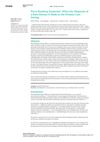 3 citations,
July 1996 in “Clinics in Dermatology”
3 citations,
July 1996 in “Clinics in Dermatology” Cytokines are important for immune responses and treating diseases, but they can cause side effects like fever and skin issues.
 2 citations,
January 2023 in “Dermatology Practical & Conceptual”
2 citations,
January 2023 in “Dermatology Practical & Conceptual” AB+ blood group is more common in alopecia areata patients.
 2 citations,
August 2020 in “Cosmetics”
2 citations,
August 2020 in “Cosmetics” Herbal formula shows promise for hair loss treatment.
 2 citations,
April 2017 in “Actas Dermo-Sifiliográficas”
2 citations,
April 2017 in “Actas Dermo-Sifiliográficas” Best treatment for Frontal Fibrosing Alopecia is 5-alpha-reductase inhibitors and intralesional corticosteroids.
 2 citations,
November 2016 in “PubMed”
2 citations,
November 2016 in “PubMed” People with Lichen Planus have thicker carotid artery walls, but it's not solely due to Lichen Planus when other factors are considered.
 2 citations,
January 2015 in “Springer eBooks”
2 citations,
January 2015 in “Springer eBooks” Environmental factors and exposure to toxins may contribute to male infertility by affecting sperm and hormone function.
 2 citations,
July 2014 in “Irish Journal of Medical Science”
2 citations,
July 2014 in “Irish Journal of Medical Science” The meeting discussed medical findings, including benefits of certain treatments for cancer and heart conditions, and highlighted issues like poor adherence to preventive measures and skill gaps among interns.
 2 citations,
January 2014 in “Springer eBooks”
2 citations,
January 2014 in “Springer eBooks” The book details skin conditions in older adults, their link to mental health, cancer treatment importance, hair loss remedies, and managing autoimmune and itchy skin.
 2 citations,
September 2012 in “Actas Dermo-Sifiliográficas”
2 citations,
September 2012 in “Actas Dermo-Sifiliográficas” Societal pressure for the perfect body leads to health risks and disorders.
 1 citations,
March 2024 in “Signal transduction and targeted therapy”
1 citations,
March 2024 in “Signal transduction and targeted therapy” NF-κB signaling is crucial in many diseases and can be targeted for new treatments.
 1 citations,
October 2023 in “Dermatology and therapy”
1 citations,
October 2023 in “Dermatology and therapy” Some treatments for severe hair loss work but often have side effects, with baricitinib showing the most promise.
 1 citations,
November 2022 in “World Family Medicine Journal /Middle East Journal of Family Medicine”
1 citations,
November 2022 in “World Family Medicine Journal /Middle East Journal of Family Medicine” People in Jeddah know about Vitamin D and its sources but are unclear on how much they need daily, and while many women take supplements, attitudes towards increasing Vitamin D levels vary.
 1 citations,
June 2021 in “International Journal of Dermatology”
1 citations,
June 2021 in “International Journal of Dermatology” People with alopecia areata had lower vitamin D levels, but these levels didn't relate to many aspects of the condition.
 1 citations,
January 2021 in “Acta dermatovenerologica Alpina, Pannonica et Adriatica (Tiskana izd.)”
1 citations,
January 2021 in “Acta dermatovenerologica Alpina, Pannonica et Adriatica (Tiskana izd.)” High prolactin levels might be linked to hair loss in autoimmune thyroid disease, but more research is needed.
 1 citations,
March 2019 in “Lasers in Surgery and Medicine”
1 citations,
March 2019 in “Lasers in Surgery and Medicine” The conference reported improvements in muscle volume, skin cancer diagnosis, facial and vaginal rejuvenation, and hair growth using various laser treatments.
 1 citations,
August 2015 in “Current Sexual Health Reports”
1 citations,
August 2015 in “Current Sexual Health Reports” 5α-reductase inhibitors can cause serious and possibly lasting sexual and psychological side effects.
 1 citations,
December 2014
1 citations,
December 2014 Some drugs have gained approval for new uses, while others like tricyclic antidepressants and aspirin show promise but aren't yet approved for these uses.
 1 citations,
May 2014 in “European Journal of Inflammation”
1 citations,
May 2014 in “European Journal of Inflammation” A lotion with minoxidil, hydrocortisone butyrate, and 17a-estradiol can improve or stabilize Frontal Fibrosing Alopecia in some cases, but there's no universally-accepted treatment yet.
 1 citations,
May 2013 in “Journal of the Egyptian Women's Dermatologic Society (Print)”
1 citations,
May 2013 in “Journal of the Egyptian Women's Dermatologic Society (Print)” Women with hair loss have higher heart disease risk and unhealthy cholesterol levels.
 1 citations,
June 2010 in “Development”
1 citations,
June 2010 in “Development” The document concludes that pig iPSCs show promise for transplant therapies and the field is advancing in controlling cell behavior for biology and medicine.
 1 citations,
June 2010 in “Expert Review of Dermatology”
1 citations,
June 2010 in “Expert Review of Dermatology” Covers common skin issues in kids, their diagnosis, treatment, and need for specialist care.
 1 citations,
November 1976 in “Archives of Dermatology”
1 citations,
November 1976 in “Archives of Dermatology” Dermatopathology has made significant progress but many skin diseases remain incurable, requiring ongoing research.
 June 2024 in “Research Square (Research Square)”
June 2024 in “Research Square (Research Square)” Young women in West Bengal, India, with PCOS often have estrogen resistance, leptin receptor issues, folate deficiency, T2DM, and acanthosis, commonly linked to obesity.

New treatments for skin conditions show promise, especially Coacillium® for hair growth in young people with alopecia areata.
 March 2024 in “PLoS medicine”
March 2024 in “PLoS medicine” Physical activity, height, and smoking affect prostate cancer risk.
 March 2024 in “Cirugía y Cirujanos (English Edition)”
March 2024 in “Cirugía y Cirujanos (English Edition)” Kidney transplant patients often have skin issues, mainly infections.

Early-onset baldness is linked to genetics, lifestyle, and can indicate higher risk for heart and metabolic diseases, and affects mental health.
 February 2024 in “PloS one”
February 2024 in “PloS one” Tofacitinib and adalimumab are promising treatments for cicatricial alopecia with few side effects.
 November 2023 in “Klìtinna ta organna transplantologìâ”
November 2023 in “Klìtinna ta organna transplantologìâ” MSC-derived exosomes can help treat COVID-19, hair loss, skin aging, and arthritis.

Parry Romberg syndrome requires awareness and teamwork in primary care for proper diagnosis and management.






























